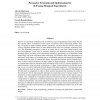Free Online Productivity Tools
i2Speak
i2Symbol
i2OCR
iTex2Img
iWeb2Print
iWeb2Shot
i2Type
iPdf2Split
iPdf2Merge
i2Bopomofo
i2Arabic
i2Style
i2Image
i2PDF
iLatex2Rtf
Sci2ools
111
click to vote
JMLR
2011
2011
Parameter Screening and Optimisation for ILP using Designed Experiments
Reports of experiments conducted with an Inductive Logic Programming system rarely describe how specific values of parameters of the system are arrived at when constructing models. Usually, no attempt is made to identify sensitive parameters, and those that are used are often given “factory-supplied” default values, or values obtained from some non-systematic exploratory analysis. The immediate consequence of this is, of course, that it is not clear if better models could have been obtained if some form of parameter selection and optimisation had been performed. Questions follow inevitably on the experiments themselves: specifically, are all algorithms being treated fairly, and is the exploratory phase sufficiently well-defined to allow the experiments to be replicated? In this paper, we investigate the use of parameter selection and optimisation techniques grouped under the study of experimental design. Screening and response surface methods determine, in turn, sensitive para...
Related Content
| Added | 14 May 2011 |
| Updated | 14 May 2011 |
| Type | Journal |
| Year | 2011 |
| Where | JMLR |
| Authors | Ashwin Srinivasan, Ganesh Ramakrishnan |
Comments (0)

